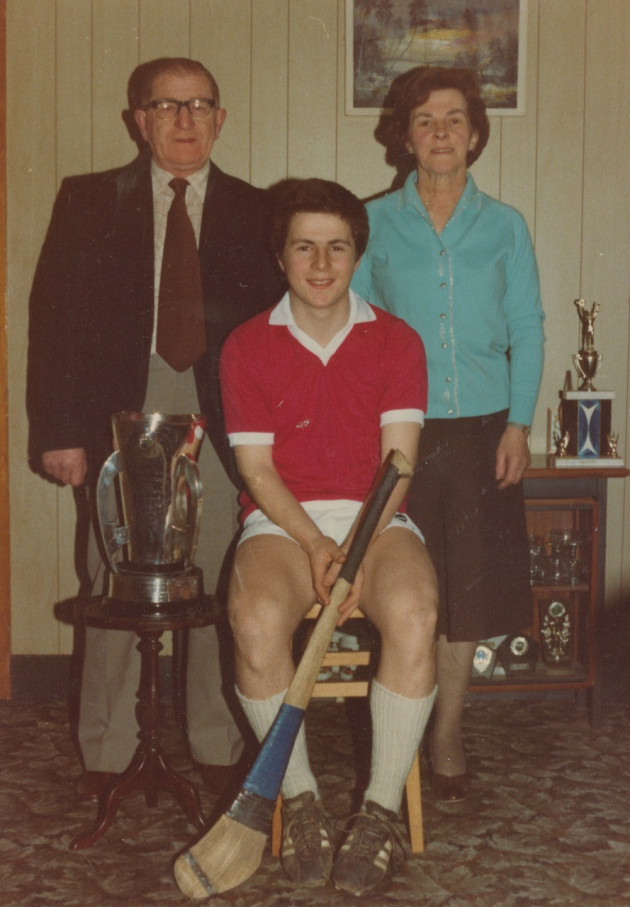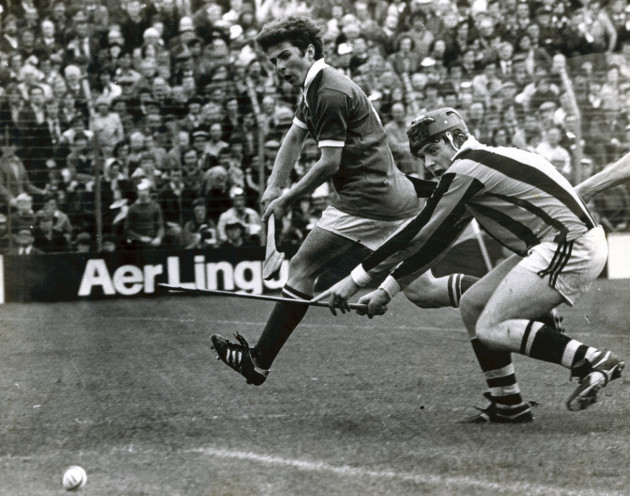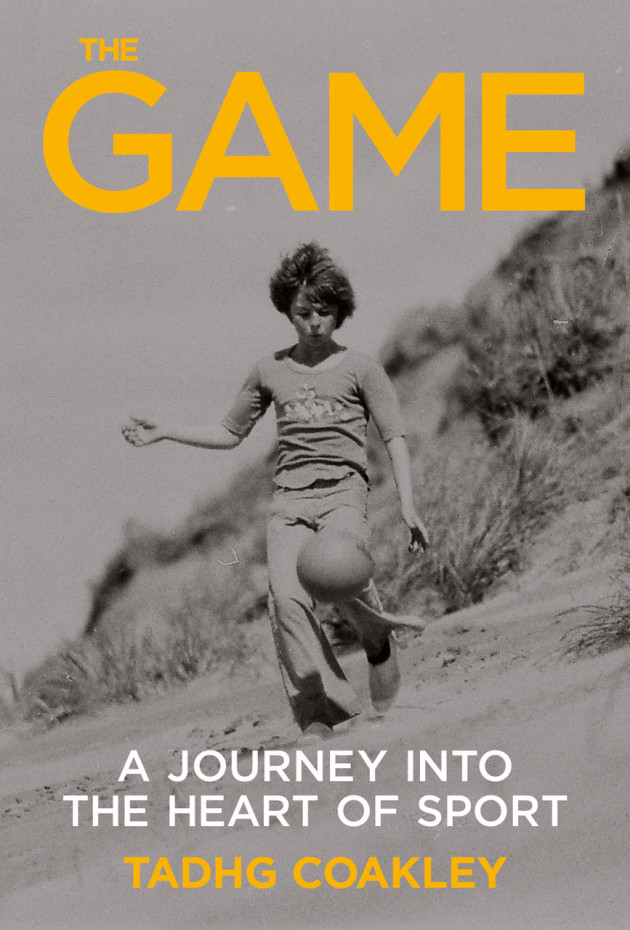Ekstasis
Ekstasis. Noun. From the Ancient Greek ἔκστασις (‘to be or stand outside oneself, a removal to elsewhere’ from ek- “out” and stasis “a stand, or a standoff of forces”.
You are on a Cork Under-16 hurling development team playing against Kerry in Ballyheigue.
It is mid-winter and freezing cold and early in the game snow begins to fall, in that silent, busy, fast, slow, dreamlike way that snow has of just coming and coming and blurring the air and sticking to the wet, dumb ground.
You and the other hurlers play on in the quiet whiteness and the normal sounds – the slap of a sliotar into a hand, the ‘pock’ of a hurley hitting the ball, the crack of hurley on hurley, the call of a player or a mentor – the normal sounds are not normal, but strange, heightened and otherworldly.
You are subdued by the eeriness that has descended – boys giving their all in their county jerseys, hurling in the snow – the ball hard and unyielding, your hurleys rigid and strange in your perished hands, your chests heaving, your breaths misting, the goals dimming to distance in the falling snow.
Your hair and faces and jerseys softly spiked with it. The snow becoming part of the game, falling faintly, faintly falling as Joyce wrote, as you run around in the whiteness, hurling; the stamp of your boots making a slight creaking crunching sound at the edges of the immeasurable white pitch.
***
You’re watching the Wimbledon Final between John McEnroe and Björn Borg. It is 4 July 1981 and you are 20 years old. You’re looking at the match in silence in the living room of your house on the Cork Road.
Your father is asleep in another chair. He has turned the sound down and you don’t dare turn it up again in case he wakes and wants to change the channel. As you arrive, Borg is serving. He is 5–4 down in the fourth set and he needs to win the game to stay in the match.
The grass on Centre Court is parched. McEnroe wears a red headband under his long, curly hair. He is tall and thin. He plays in silence. Borg wears a blue and white headband under long straight hair. He is tall and thin. He plays in silence. Borg is trying to win his sixth consecutive Wimbledon title and complete a 42 consecutive match-winning run in the tournament.
In the 1980 Final (the previous year) – long considered to have been the greatest tennis match in history – Borg had beaten McEnroe. You want McEnroe to win, so badly. It’s all you crave. He is everything you adore and cannot be: anti-establishment, iconoclastic, fiery, rebellious, arrogant, noisy, inconsiderate, virtuoso. He breaks Borg’s serve and drops to his knees in silence.
You rise to your feet and punch the mute air. You leave the room, closing the door quietly behind you. You go into your bedroom and sit on the bed and look out the window. You just sit there, looking out the window, in the silence.
***
You’re playing football for Mallow United, down the Town Park. There’s a big home crowd cheering the team on only a few feet from the sideline. It’s a must-win top-of-the-league game against St Mary’s, your big rivals.
You’re playing midfield, up against their best player, Martin O’Sullivan, who’s heading to the League of Ireland at the end of the season. In the first half he gets the ball and powers towards the Mallow goal. You track back and chase him down.
Somehow, you slide in and hook your right foot around the football and win possession, then pivot to put your body between him and the ball. He drags you down. The crowd bellows outrage and then approval as the referee blows for a free kick. You jump up and run back towards the halfway line.
‘You good thing, Coakley,’ Daniel O’Callaghan, your teammate, says, running beside you.
‘Ah come on, Martin!’ the St Mary’s coach shouts. ‘Don’t let him do that.’ You breathe deeply. You have this. You’re better than him. You know this. You can do anything.
Anything you want. The winning of the game is yours. Mallow will win and you will make this happen – nothing has ever been more certain in your life. You will do this. You.
***
It is your last championship hurling game for Mallow, in 1991, against Midleton in Castlelyons. It’s early in the summer and you are the captain of the team. The game is drifting into loss, Mallow are four points down, but you are desperate for that not to happen.
If you are beaten, the summer of hurling is over – all hurling is over. You can’t lose. You can’t. You make a frantic effort to score a goal, the ball just managing to worm itself into the corner. Now you will score again, now you will finish the comeback. Moments later, the man marking you turns and puts out his hand for you to shake. ‘What?’ you say.
‘What’s happening?’ He looks at you strangely. ‘It’s over, Tadhg,’ he says. ‘He blew it up.’ Another Midleton player approaches you. He says: ‘Hard luck.’ He looks at you strangely, too. You shake hands with him. You have no idea what is happening. All the players are walking off the pitch. You have no idea what is happening.
***
The All-Ireland hurling semi-final between Cork and Limerick in Croke Park. 29 July 2018. There has been a sense of unreality in the wash of your emotions all day. The water on Smerwick Harbour a slate grey, waves flecking the surface as you drive past Mount Brandon on your way to Farranfore.
A swell of anticipation in the airport, a feeling of belonging, of being among your own. Ease and comfort on the plane; disbelief to be outside a sun-scrubbed Dublin Airport at 10 am, when moments before you were passing through Milltown and Firies.
Envy, perhaps loss, when overhearing a father and son’s intimate conversation on the bus into town. A sense of being blessed, privileged, to be walking in O’Connell Street as the Cork and Limerick fans stroll past the multicultural mix that is Dublin these days.
Well-being, rightness. A returning, a catching up with old friends over pints – the feeling of identity, of ritual. With Ray, Michael and Kieran in the Palace Bar on Fleet Street. A kind of joy, not hindered by the porter, while the conversation interlaces itself around you, as natural and full of grace as bird flight. ‘Sean South’ breaks out from inside the back room – the Limerick lads have begun early.
At the old call of the music your emotions shift from your chest to your gut and swell there. There, from an older place, you can reach outward as well as inward, backwards and forwards. You’re charged, heightened, more than yourself. You can see everything, and everything is beautiful.
The Game: A Journey Into The Heart of Sport by Tadhg Coakley is published by Merrion Press.



